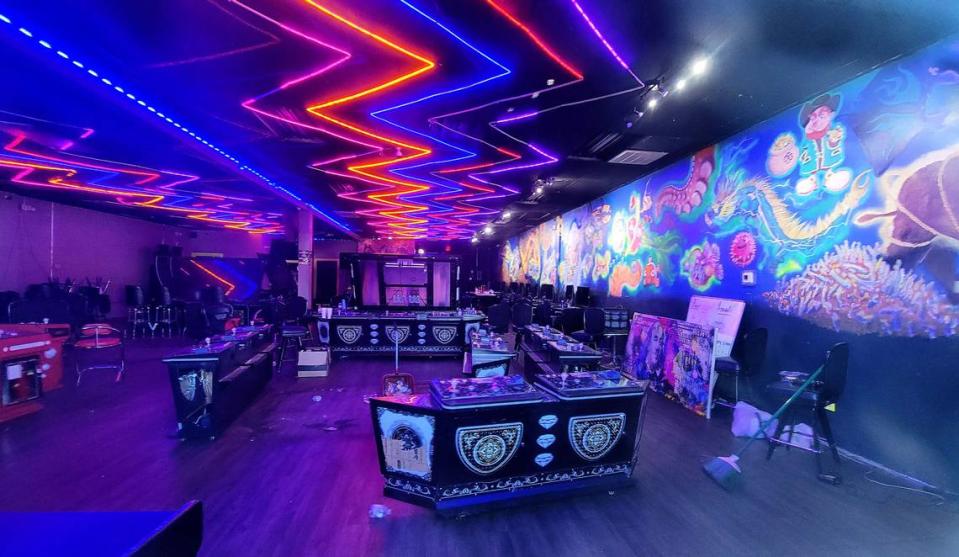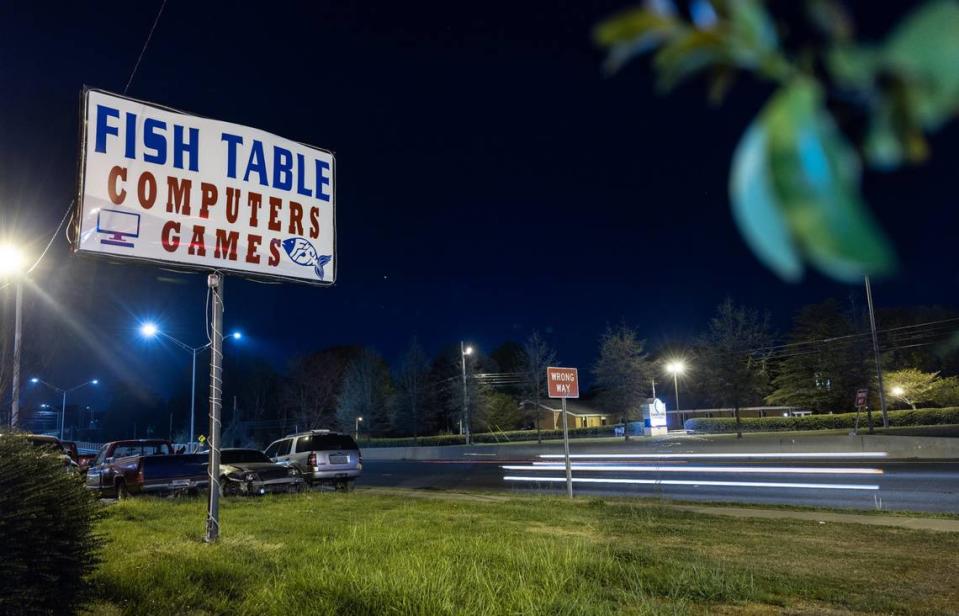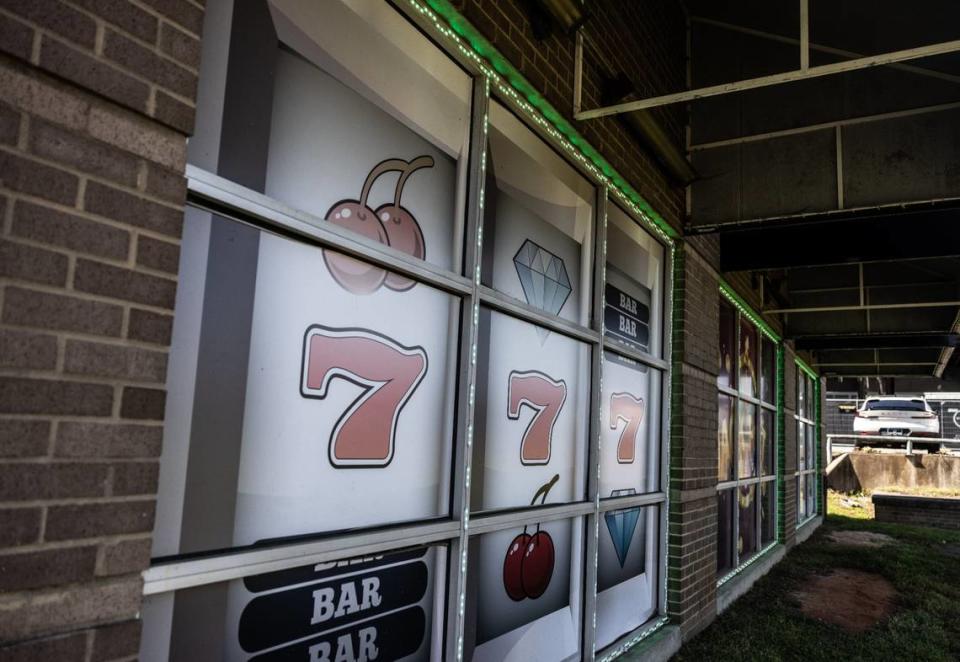Once all over, Charlotte’s fish game arcades have gone dark — for good?
Zigzagging neon ceiling lights lit dozens of screens in a purple haze. A mural of fish kept watch over rows of gambling machines. Each corner offered a renewed chance at fortune, and an ATM to the side suggested endless chances.
The Fun Spot Arcade in Charlotte’s Lower South End neighborhood used to be ... well, fun.
Now there’s loose tobacco emptied from a cigarillo piled in front of the recently abandoned building.
A dust pan filled with fast-food wrappers and cigarette butts sits where patrons would normally be greeted by an armed security guard.
Empty energy drinks mark the most dedicated players’ thrones, now collecting dust instead of dough.
The once-bustling Charlotte arcade used to draw gamblers itching for their shot at the latest gambling craze: fish games.
But places like it — an estimated 100 in the city — have been forced to close or go underground after drawing renewed attention from police.

When the games popped up more than five years ago, the arcades challenged North Carolina’s decades-long ban on gambling, video poker and similar games outside regulated casinos or the state-run lottery.
Fish games let multiple players at a gaming table shoot at aquatic creatures swimming across a 6-foot screen. When they hit fin, they win big. But when money runs out, the guns go kaput.
Operators claim the game is based on skill: if you’re good, you win money; if you’re not, you don’t.
That distinction is important because North Carolina’s strict gambling laws prohibit (with some exception) gambling or winning money on games purely based on random chance, like a slot machine.
Initially, fish game arcades faced widespread law enforcement raids or at best operated in a legal gray area. When one arcade appealed a court’s ruling that its games were illegal, the operator won a restraining order that effectively blocked prosecution starting in June 2021.
That case was lost at the state Supreme Court last year, lifting the restraining order and unleashing a new wave of police raids in Charlotte.
Fun Spot Arcade’s closure is one of at least 100 locally in the last year. A Charlotte-Mecklenburg Police Department investigation counted more than 130 illegal gambling locations in May. In February, authorities raided two well-attended arcades, disabling more than 170 machines and seizing more than $95,000.
Now, only one or two dozen remain.
The Charlotte Observer visited more than a dozen known arcade locations in March. Most were abandoned, like Fun Spot Arcade; the only signs of recent activity were lone neon signs or handwritten notes warning visitors they won’t be let in without taking off masks, sunglasses and hoodies.
A few unlisted arcades seemed to remain open, their cover blown by packed parking lots and banners advertising “skill games.”
Even with the option to remain anonymous, none wanted to talk about recent police crackdowns.

Arcades shut down in Charlotte
In east Charlotte, an otherwise unassuming building sits near Independence Boulevard with a banner strewn across its bricks: “Open Fish Games.”
An old marquee sign out front donned its name: “White House Arcade Fish Table & Arcade.”
Only a few cars lined the broken chain link fence along its parking lot. A disclaimer covered its front door: “This is a NFT Trading Facility. This is NOT a Sweepstakes or Skill Game Facility. Any funds exchanged in this Facility is done through exchange of NFT Trading.”
After multiple rounds of knocking, a security guard answered. He declined to comment on the arcade’s nature before quickly shutting the door.

One block away, a man tried to enter another arcade. It’s been closed for months, but a sign taped to the building’s blacked-out door redirects visitors to City Arcade — where a man was shot in the parking lot after a dispute in mid-March. Police arrested and charged a suspect with first-degree murder.
In between the two gambling hot-spots sits Steamers Sports Pub. Bill Nolan, 66, has owned the bar for nearly 30 years. He remembers when the now-closed arcade was a dry cleaners.
He liked it better then.
Nolan watched the owners tailor the arcade to the likeness of an after-hours club, ushering liquor, beer, drugs and strippers inside, he said.
“We have to dot our i’s and cross our t’s,” he said of his own bar. “But across the street it’s a free-for-all.”
Law enforcement officials tend to agree. The arcades — because they offer cash prizes but operate without gambling authority in North Carolina — face little to no oversight.
Beyond improperly reporting earnings, allowing smoking indoors and selling alcohol without permits, arcades serve as “havens for criminal activity” and bring violent or drug-related crime to the surrounding areas, according to CMPD’s Special Investigations Bureau.
To begin the recent shutdowns, CMPD’s Alcohol and Beverage Control Unit delivered its first round of letters to each of the 130 arcades last May, warning owners of pending law-enforcement action once courts solidified statues deeming the games inside illegal.
Some shut down as soon as they read the letter, some boarded up after police busted an arcade in September.
Some tested their luck for as long as they could, ignoring authorities’ warnings or flying under their radar altogether.
Across from Steamers Sports Pub, machines used to chatter away— every day and every night.
One particularly tense night, when the arcade’s patrons’ cars packed his parking lot, Nolan confronted the security guards. After he threatened to call the police, they told him he had 30 seconds to get off the property.
“Do whatever you want, cops ain’t doing nothing to us,” they said while standing outside with bulletproof vests and multiple guns, according to Nolan.
Nolan stopped calling police once he realized the guards were right.
He resorted to closing his bar two hours earlier than normal in order to avoid any more encounters. The changed hours cost him about 20% in revenue and cut his employees’ tips significantly.
But it was better than dealing with the patrons who would stumble in after losing hundreds across the street — sometimes unable to pay for the takeout meal they called in before walking over.
“All of a sudden, there’s like a truckload of them,” he said. “It was insane. They’d chase our good regulars out of the building.”
But it’s not the gambling Nolan is opposed to, he said. He misses the days he was allowed to have poker machines in his bar. People are ready to gamble, he said, it’s just a matter of creating the right channels for them to go through.

On the other side of the arcade, cars filled the neighboring mechanic’s parking lot. Lopez, who requested to use only his last name for fear of retaliation from the arcade’s owners, said drunk patrons were the worst nuisance during his 10 years at the shop. They would leave broken liquor bottles scattered along the lot after stealing parts from his customers’ cars.
Since the games stopped chattering a few months ago, some gamblers may have ventured farther down the road to Lucky Seven Arcade.
By 4 p.m. one Tuesday, its parking lot, shared with a phone repair shop and Mexican restaurant, was full. Cars crowded surrounding curbs and sidewalks as an armed security guard with glazed eyes opened the door every two minutes, letting out smoky air as he greeted patrons — some by name and others with just a smile or nod.
The guard directed the Observer to speak to a manager, but there wasn’t one there.
The arcade is one of the last vestiges of hole-in-the-wall spots that let gamblers test their luck with just a drive down the street.
The scene is one authorities are eager to purge, but it’s one Freedom Fodiaba misses. The Tobacco & Vape manager worked next to an arcade near the intersection of Monroe Road and North Wendover Road.
It was always full, she said, and there were never police.
The owner didn’t mind her loud music. The customers were polite. The neighboring businesses could have benefited from a mutual relationship, allowing patrons to buy a pack or two of cigarettes before passing through the blacked-out windows.
But now the strip mall sits with only two of its three storefronts filled. As crackdowns continue, unregulated arcades morph from a familiar morning-commute sight to another relic of North Carolina’s gambling history, remembered only by dangling LED lights outside abandoned buildings and the memories — good or bad — that remain in the minds of patrons who have been ousted from the padded chairs that were once their thrones.
